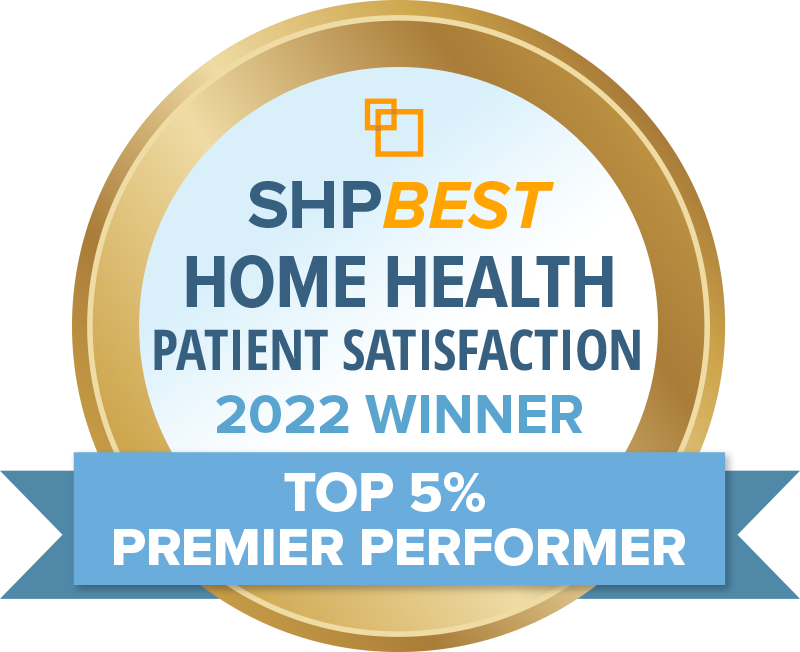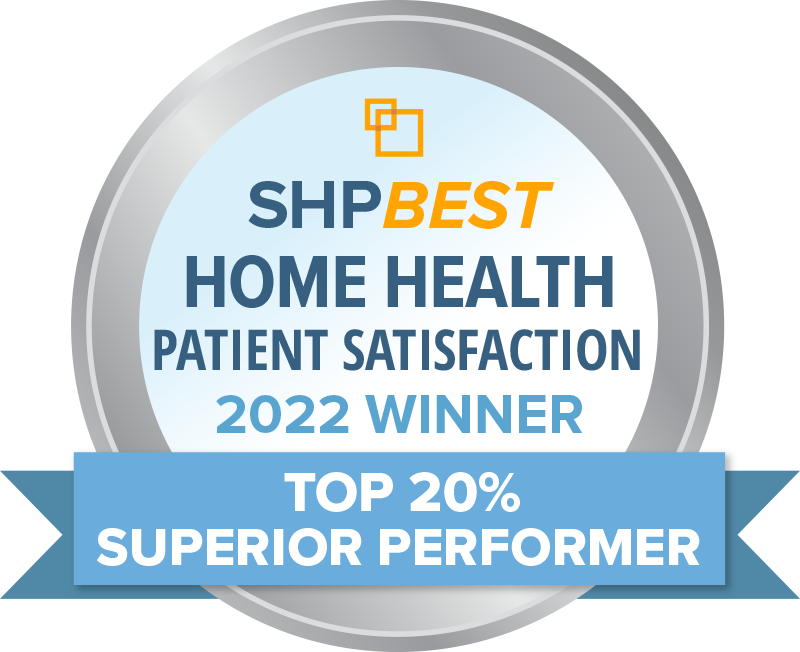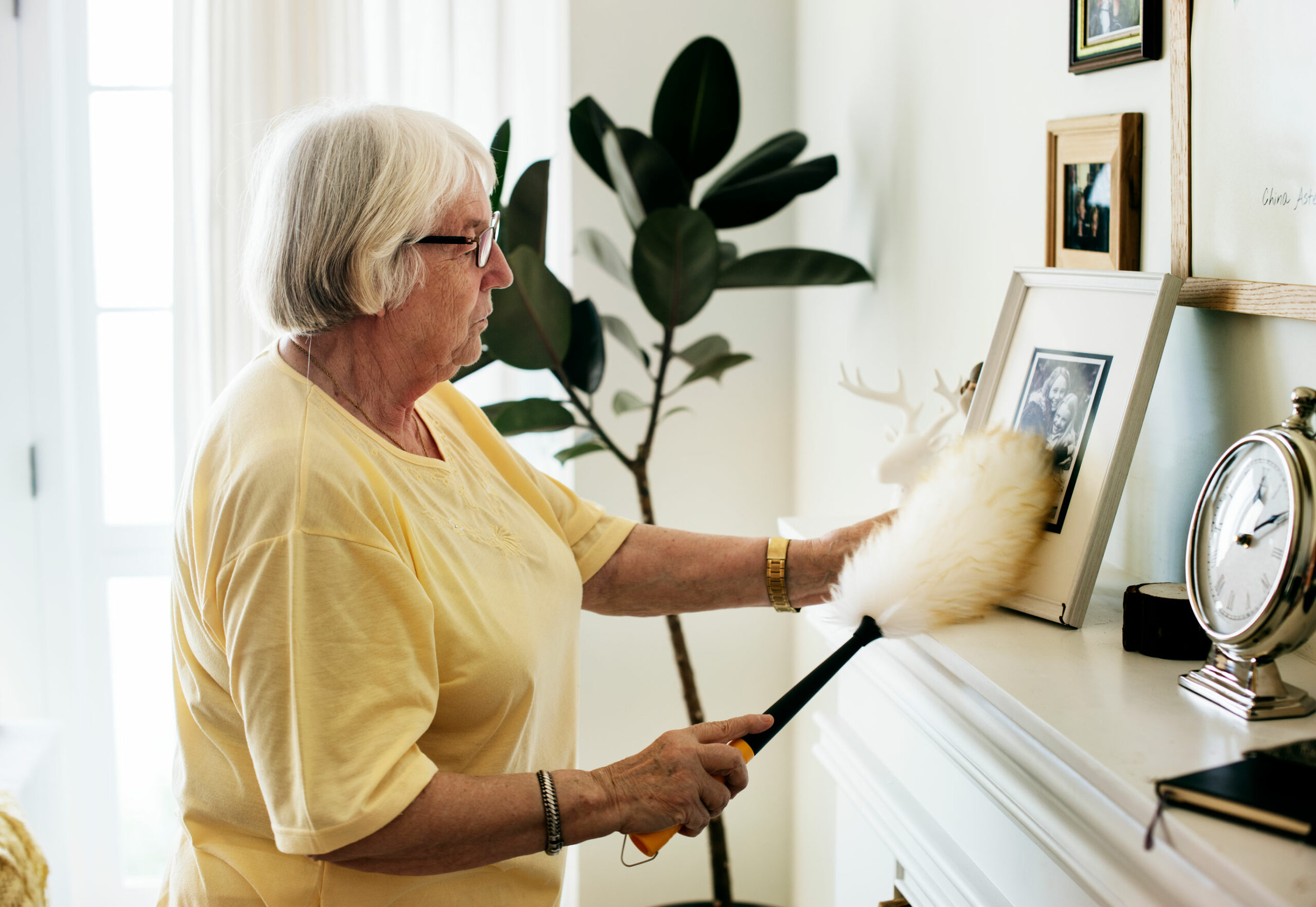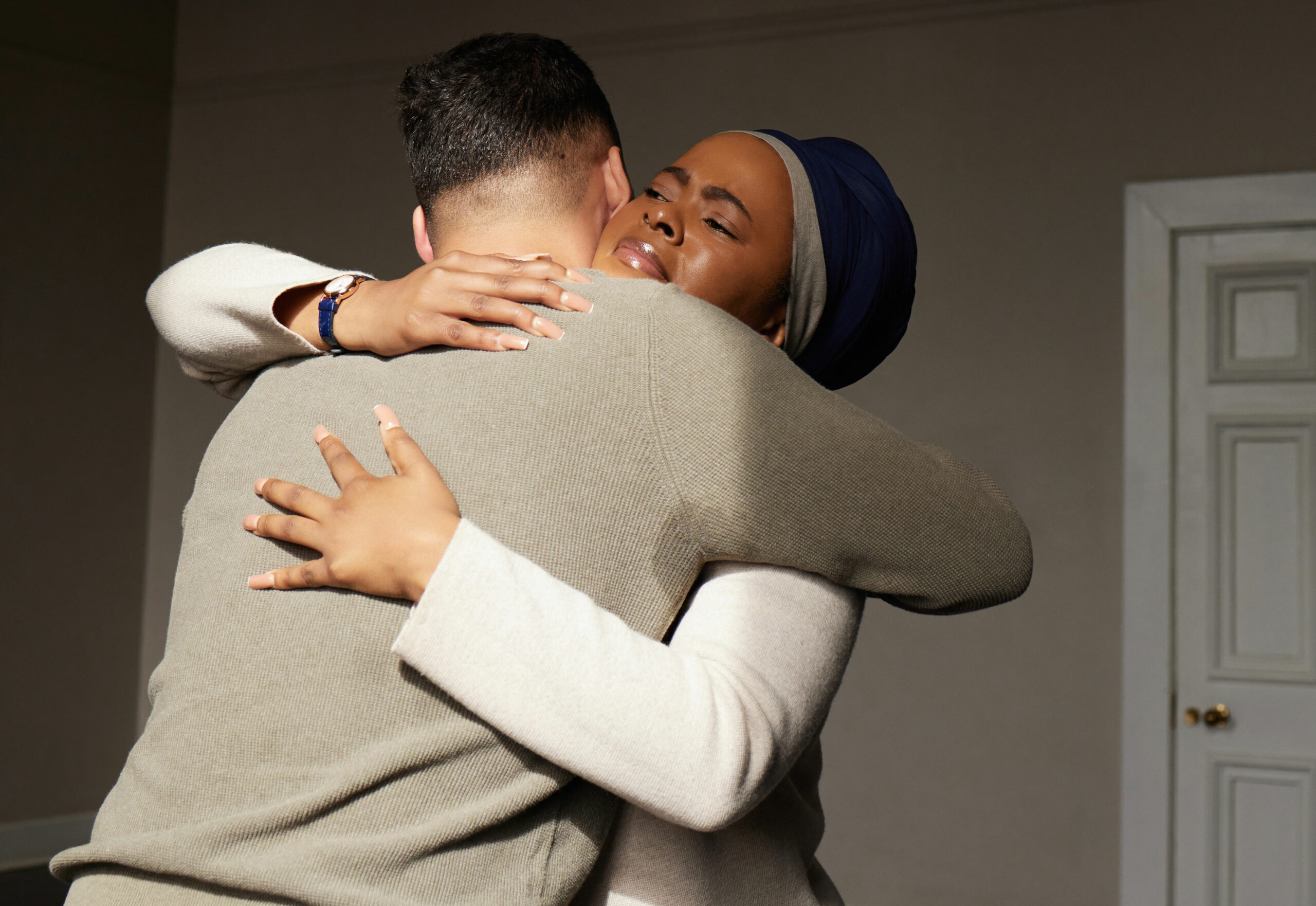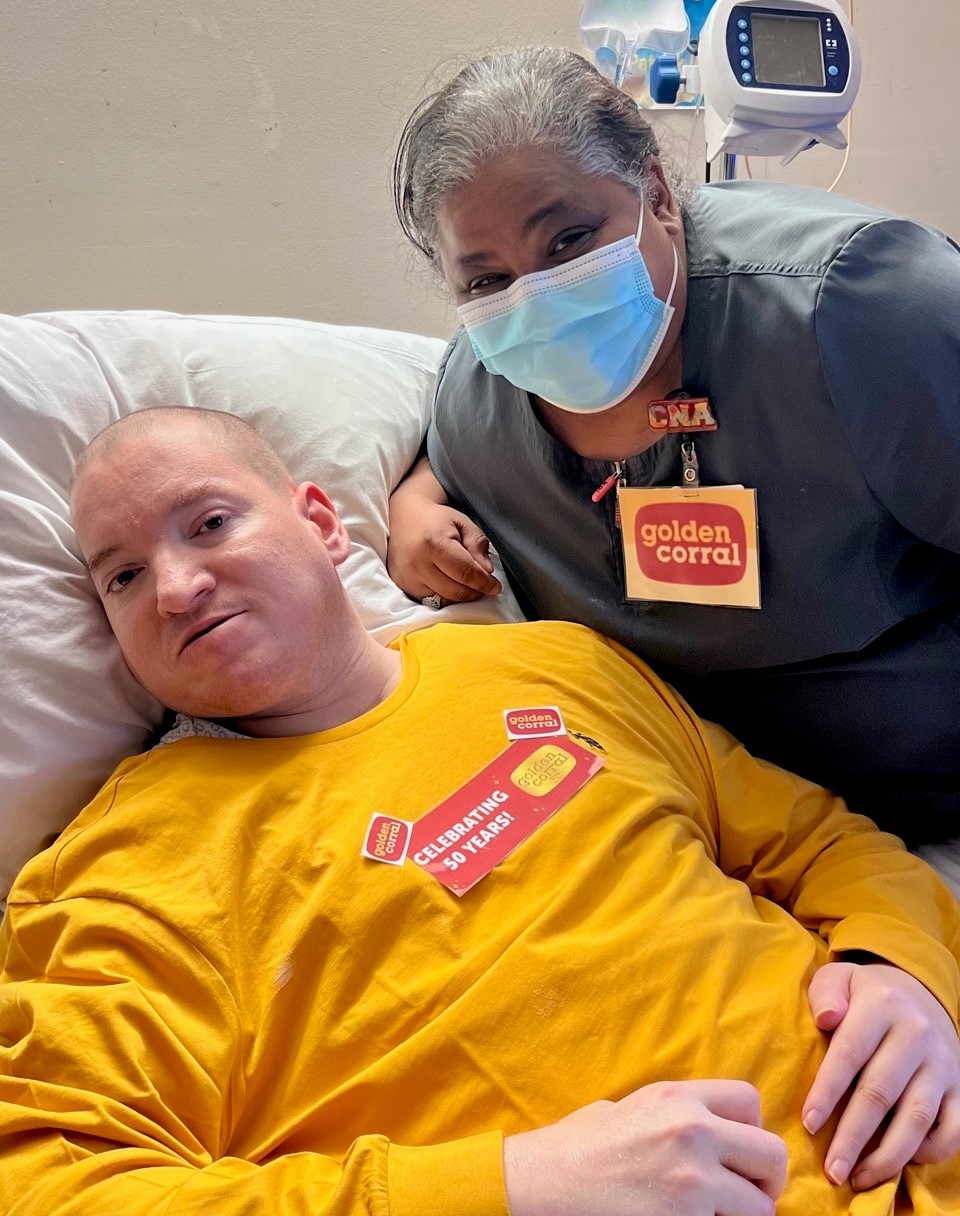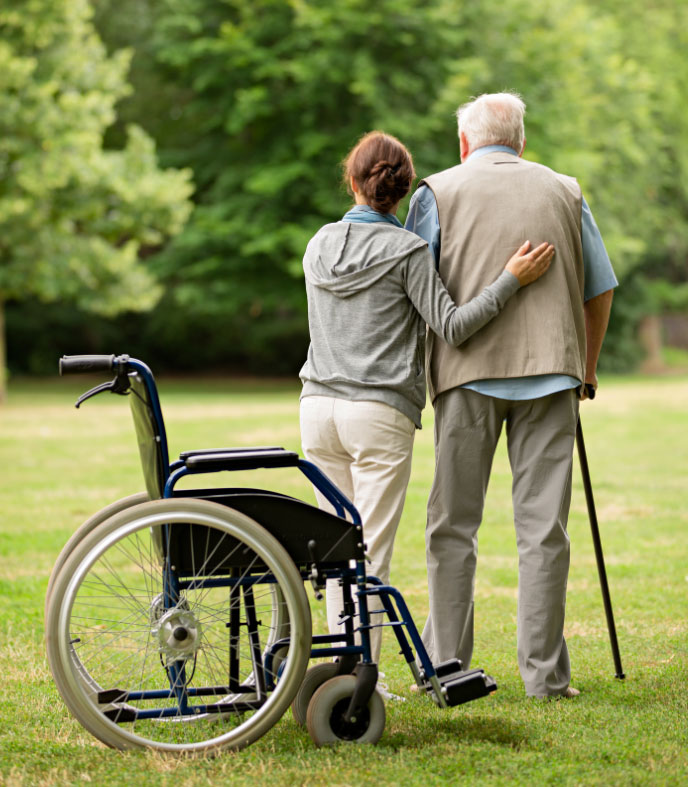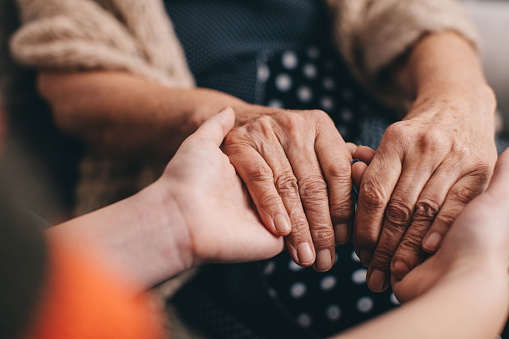Two Liberty Home Care Locations Earn 2022 SHPBestTM “Premier Performer” Patient Satisfaction Awards
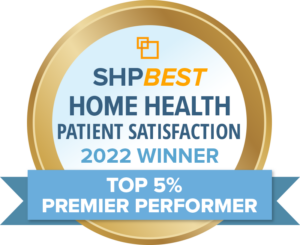
Liberty Home Care locations serving Elkin, North Carolina and Stuart, Virginia have been recognized by Strategic Healthcare Programs (SHP) as a “Premier Performer” for achieving an overall patient satisfaction score that ranked in the top 5 percent of all eligible SHP clients for the 2022 calendar year.
The annual SHPBest™ award program was created to acknowledge home health agencies that consistently provide high quality service to their patients. The 2022 award recipients were determined by reviewing and ranking the overall satisfaction score for more than 3,200 home health providers. With the largest HHCAHPS benchmark in the nation, SHP is in a unique position to identify and recognize organizations that have made patient satisfaction a priority and have been rewarded for their efforts with high marks on the HHCAHPS survey.
“SHP is very excited to have the opportunity to recognize the hard work and dedication of our top-performing customers with the annual SHPBest awards. We commend these organizations for their determination to provide top-notch care to the patients and caregivers that they serve,” said Kevin Vogel, President of SHP.
Liberty Home Care’s Elkin and Stuart locations previously received a “Superior Performer” award, ranking in the top 20 percent of all eligible SHP clients in 2021. The Stuart location also received a “Superior Performer” award in 2019 and 2018. No awards were given in 2020 due to the pandemic.
Liberty HomeCare and Hospice Services provides home health care, hospice care and palliative care throughout North Carolina, South Carolina and Virginia. For additional information about our services and locations, please visit our website or call (800) 999-9883.
About Strategic Healthcare Programs (SHP)
Strategic Healthcare Programs (SHP) is a leader in data analytics and benchmarking that drive daily clinical and operational decisions. Our solutions bring real-time data to post-acute providers, hospitals, and ACOs to better coordinate quality care and improve patient outcomes. Since 1996, SHP has helped more than 7,000 organizations nationwide raise the bar for healthcare performance.
Five Liberty Home Care Locations Earn 2022 SHPBestTM “Superior Performer” Patient Satisfaction Awards
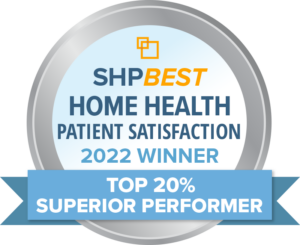
Liberty Home Care locations serving Siler City/Sanford, Jacksonville, Whiteville, Myrtle Beach and Danville have been recognized by Strategic Healthcare Programs (SHP) as a “Superior Performer” for achieving an overall patient satisfaction score that ranked in the top 20 percent of all eligible SHP clients for the 2022 calendar year.
The annual SHPBest™ award program was created to acknowledge home health agencies that consistently provide high quality service to their patients. The 2022 award recipients were determined by reviewing and ranking the overall satisfaction score for more than 3,200 home health providers. With the largest HHCAHPS benchmark in the nation, SHP is in a unique position to identify and recognize organizations that have made patient satisfaction a priority and have been rewarded for their efforts with high marks on the HHCAHPS survey.
“SHP is very excited to have the opportunity to recognize the hard work and dedication of our top-performing customers with the annual SHPBest awards. We commend these organizations for their determination to provide top-notch care to the patients and caregivers that they serve,” said Kevin Vogel, President of SHP.
Liberty Home Care’s Siler City/Sanford location has been a “Superior Performer” four years in a row, also earning the award in 2018, 2019 and 2021. Liberty Home Care’s Jacksonville location has been a “Superior Performer” three years in a row, also earning the award in 2019 and 2021. No awards were given in 2020 due to the pandemic.
Liberty HomeCare and Hospice Services provides home health care, hospice care and palliative care throughout North Carolina, South Carolina and Virginia. For additional information about our services and locations, please visit our website or call (800) 999-9883.
About Strategic Healthcare Programs (SHP)
Strategic Healthcare Programs (SHP) is a leader in data analytics and benchmarking that drive daily clinical and operational decisions. Our solutions bring real-time data to post-acute providers, hospitals, and ACOs to better coordinate quality care and improve patient outcomes. Since 1996, SHP has helped more than 7,000 organizations nationwide raise the bar for healthcare performance.
Spring Cleaning Tips for Seniors and Their Caregivers
The birds are chirping, the buds are budding and spring is in the air! This is a popular time of year to do a little spring cleaning around your home, but for some, the tasks involved in sprucing up and organizing may be difficult or cumbersome.
In this blog, we take a look at how to make spring cleaning a bit easier and how caregivers can help their loved ones with their spring cleaning to-do list to ensure their home is a safe and happy place.
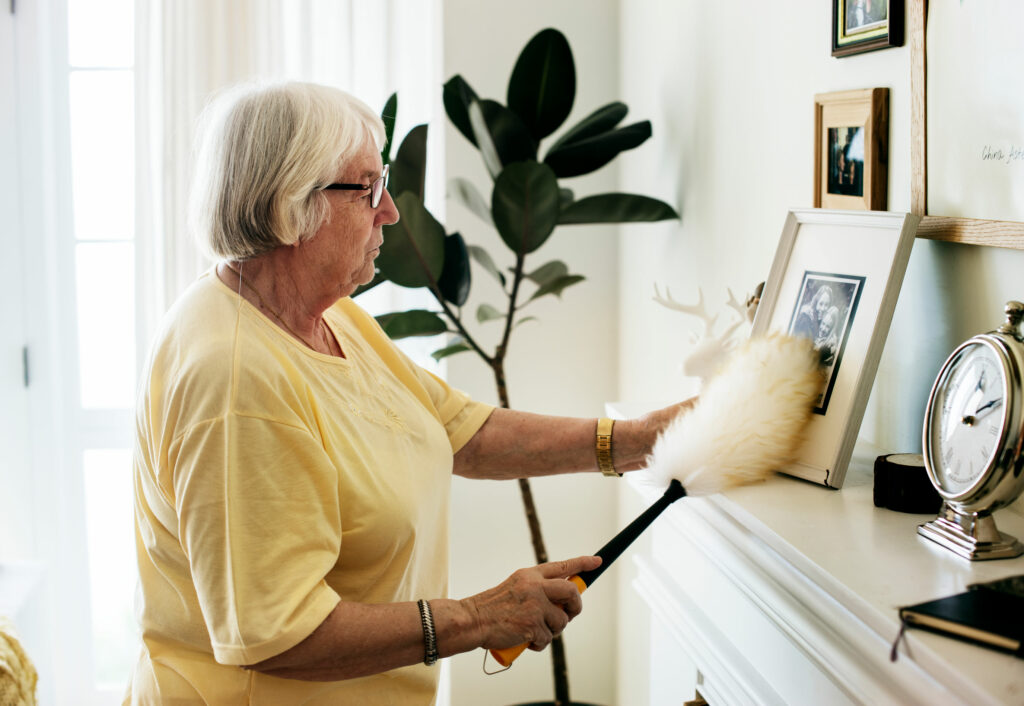 Divide cleaning tasks into sections
Divide cleaning tasks into sections
It happens to all of us. Clutter, dust and grime can pile up, especially when we get busy or neglect the cleaning needs of our home for whatever reason. Looking at your laundry list of to-do items for the entire home can be overwhelming and stressful, but it doesn’t have to be.
Instead, break up the tasks into small sections and conquer those chores one room at a time. Spring cleaning does not have to be done all at once. Tackle each cleaning task that needs to be done in each room individually over a period of time so it doesn’t seem quite as daunting. Give yourself some grace to do things at a pace that works best for you.
Declutter your home
Make decluttering your home a priority when spring cleaning. Removing all the unnecessary clutter not only frees up space and decreases stress, it also reduces your risk of tripping and falling.
A helpful tip is to separate items into three categories: keep, donate or trash. For the items you decide to keep, be sure to store them in an organized fashion so the clutter stays out of your main space.
Organize your medicine cabinet
It’s easy for your medicine cabinet to start overflowing with medication you may no longer use or that is now expired.
The best way to safely dispose of unused or expired prescription or nonprescription medication is to drop it off at a medication take back location. If you do not have a take back location in your area, the FDA recommends checking their Flush List. Medicine on the FDA’s Flush List is either sought after for their misuse and/or abuse potential or can result in death if inappropriately taken. That is why the FDA recommends flushing that type of unused or expired medication if you do not have another way to dispose of it safely.
Once your medicine cabinet is organized, be sure to restock any essential items you may be missing.
Check smoke detectors and alarms
Something a lot of people forget to do is check to make sure their smoke detectors and alarms are working. Spring is a great time to do a yearly check to ensure everything is in working order.
To avoid climbing on a ladder or chair, ask a neighbor, friend or family member to help you do this yearly and important check.
Clean out the fridge and pantry
Remove any expired food in your refrigerator or pantry. Give these two storage areas a refresh by organizing the items inside by categories to make meal prepping easier and to help ensure food items don’t go to waste.
Change air filters and dust
Air quality plays a role in your overall health, which makes changing your air filters regularly a must. New filters catch dust, debris and keep your air conditioner running efficiently.
Dusting is also essential to improve your home’s air quality. Use an extendable duster to safely reach light fixtures, baseboards, fans and shelves where dust loves to accumulate.
Ask for help
Spring cleaning is no easy task and it is important to know your limits. Don’t be afraid to ask for help to complete tasks that may be challenging for you or put you at risk of an injury.
If you are a caregiver, be mindful of the above mentioned spring cleaning tasks that your loved one may need help with. If they are too afraid to ask for help, offer your assistance. Spring cleaning together is an opportunity to bond while lending a hand to tackle these important tasks. While visiting, take note of any other routine maintenance inside or outside that your loved one might need help with.
About Liberty HomeCare and Hospice Services
Liberty HomeCare and Hospice Services provides home health, hospice and palliative care across North Carolina, South Carolina and Virginia. To learn more about our services, request a free consultation by calling (800) 999-9883 or use our online form.
Good Grief: Tips for Healing
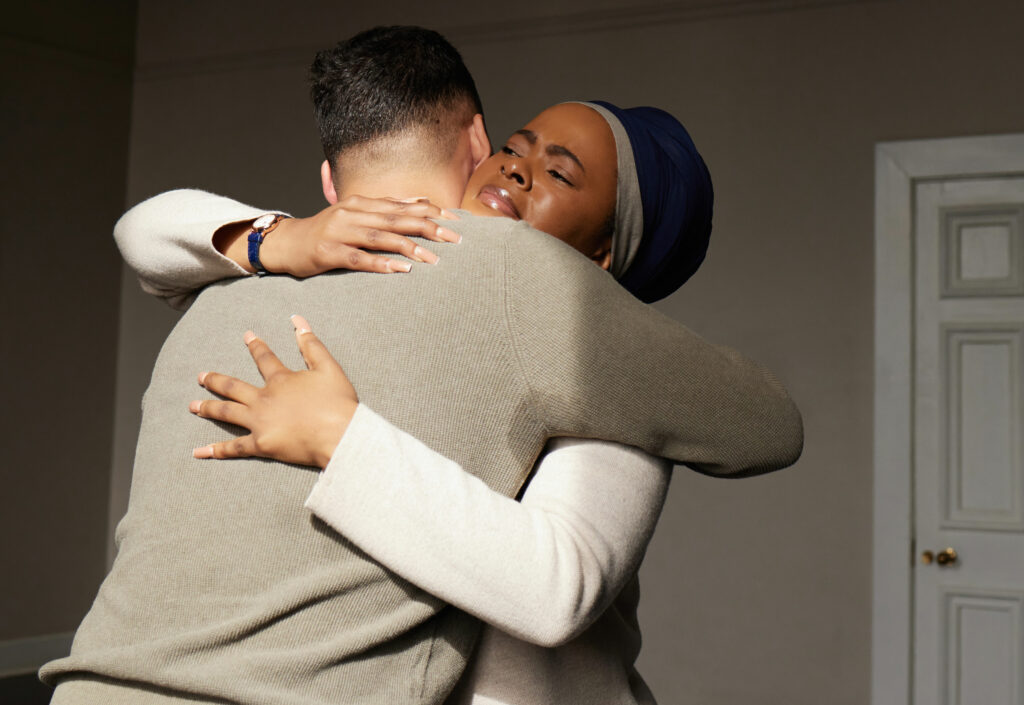 Grief can be an extremely difficult thing for people to deal with after losing a loved one. Everyone’s journey through grief is different and the way people process loss varies from person to person.
Grief can be an extremely difficult thing for people to deal with after losing a loved one. Everyone’s journey through grief is different and the way people process loss varies from person to person.
In this blog, we explain some tips that can hopefully make the process of grieving and healing a little easier.
1.) Be Yourself
If you are a feeler, allow yourself to feel. If you are a dreamer, tell the story. If you are a thinker, process it out. If you are a doer, honor your loss as you make plans for what to do next. Just be you.
2.) Set Reasonable Goals
While grieving, instead of setting one big goal, try setting many smaller goals that put you in the direction of your big goal. Doing so will make achieving your big goal more realistic, especially when you have less energy.
3.) Be Kind to Yourself
No one dismisses our grief more than we do ourselves. Be patient with yourself and remember that healing is a journey, not a destination.
4.) Spend Time with Your Grief
Try sitting with yourself in a quiet place for 5 to 15 minutes each day. Pay close attention to your breathing and body. Acknowledge any thoughts, and then let them go. Allowing time for this important one-on-one with yourself can allow you to manage your grief rather than your grief managing you.
When you are grieving, it is okay to do certain things that are important for your own well-being. Here are some examples of things you should not be afraid to do after losing a loved one:
- Say no to others. When people ask for help, it is okay to decline. Give yourself permission to grieve and know that it is okay to make time for yourself.
- Have a good day. Not every day is a sad day. You will have a good day someday and even remembering your loved one will bring you a smile.
- Reward yourself. Give yourself grace for each task you complete, knowing the effort it took to do it.
- Take a break. It is very important to rest when you need to. When life seems fast-paced, it is all right to slow down. Pay attention to your body and the effort it takes to grieve.
An important part of the care Liberty Hospice offers is bereavement for the family after their loved one passes. Bereavement care can ease the impact of death and the journey that follows. Our bereavement services for families include support programs, educational information and counseling services.
To learn more about Liberty Hospice and our bereavement services, visit our website or call 1-800-999-9883.
Moments that Matter: Liberty Hospice Serves Up Buffet for Golden Corral Fan
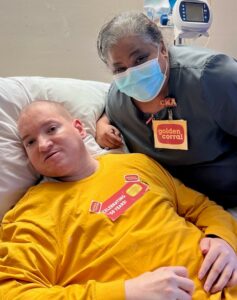
Patrick Connelly, who is receiving care from Liberty Hospice, used to love eating at Golden Corral. It wasn’t just the delicious food that attracted him to the restaurant, but the ability to make choices for himself when it came to selecting items he desired from their buffet. The ability to make choices is something many of us take for granted. For Patrick, choosing was something he desired more than anything as health complications took a toll on his daily life.
During visits to his current home at Liberty Commons Nursing and Rehabilitation Center of Lee County, Patrick expressed to his hospice care team several times just how much he loved Golden Corral. Through further discussions, Regional Volunteer Manager Charlotte Walton and Bereavement Coordinator Robin Lemieux realized the significance of the correlation between his love for the restaurant and his strong desire to make choices. Together, they decided to create a ‘Moments that Matter’ for Patrick by bringing the Golden Corral buffet to him.
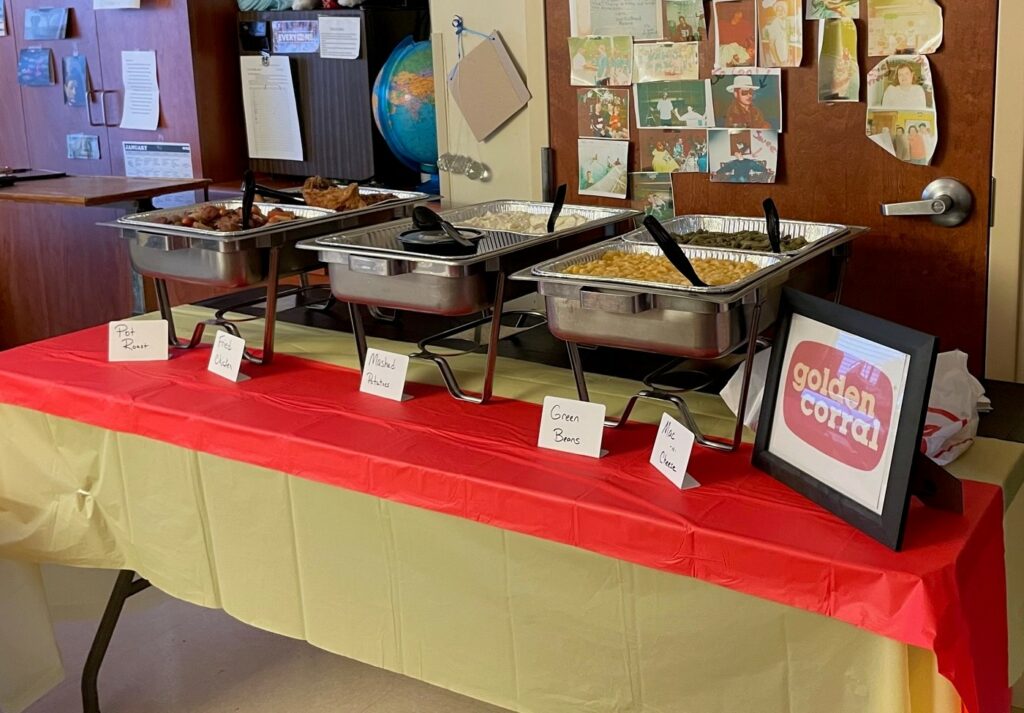
Charlotte reached out to the local Golden Corral in Sanford, North Carolina and a plan began to unfold. Patrick and Charlotte discussed his favorite foods, and she then worked with Golden Corral to ensure those foods would be on the menu for the big day.
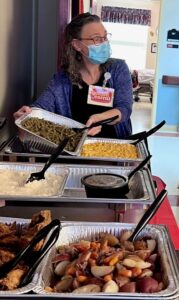
Liberty Hospice and Golden Corral set up a delicious buffet in his room at Liberty Commons. Patrick was able to choose his favorite items from his very own Golden Corral buffet.
“I know this means a lot to my son and you have no idea how much this means to my wife and me,” said Robert Connelly, Patrick’s dad. “Thank you so much for doing this – for supporting us. No one has ever done anything like this before.”
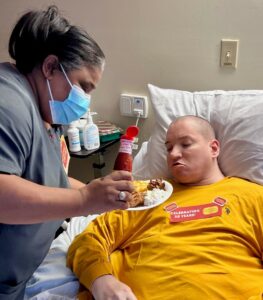
During hospice, it becomes incredibly important to celebrate ‘Moments that Matter’ with loved ones because every moment counts. Liberty Hospice is so thankful Golden Corral helped us make this moment for Patrick and his family possible.
To learn more about how Liberty Hospice can create ‘Moments that Matter’ for your family, visit our website or give us a call at 800-999-9883.
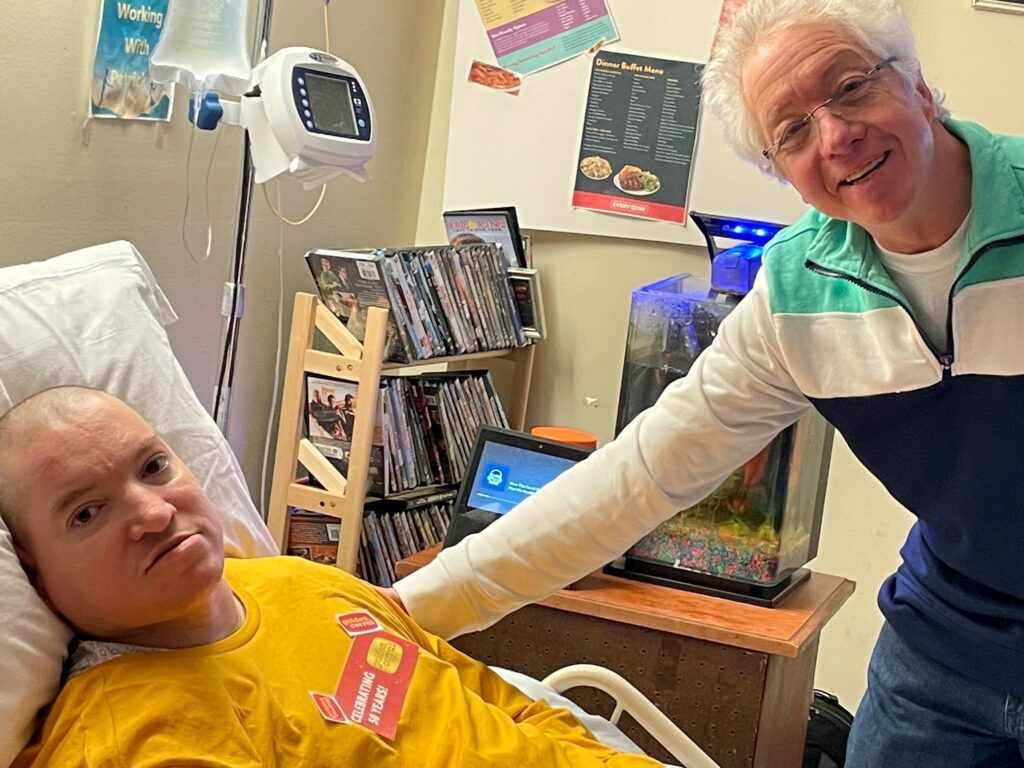
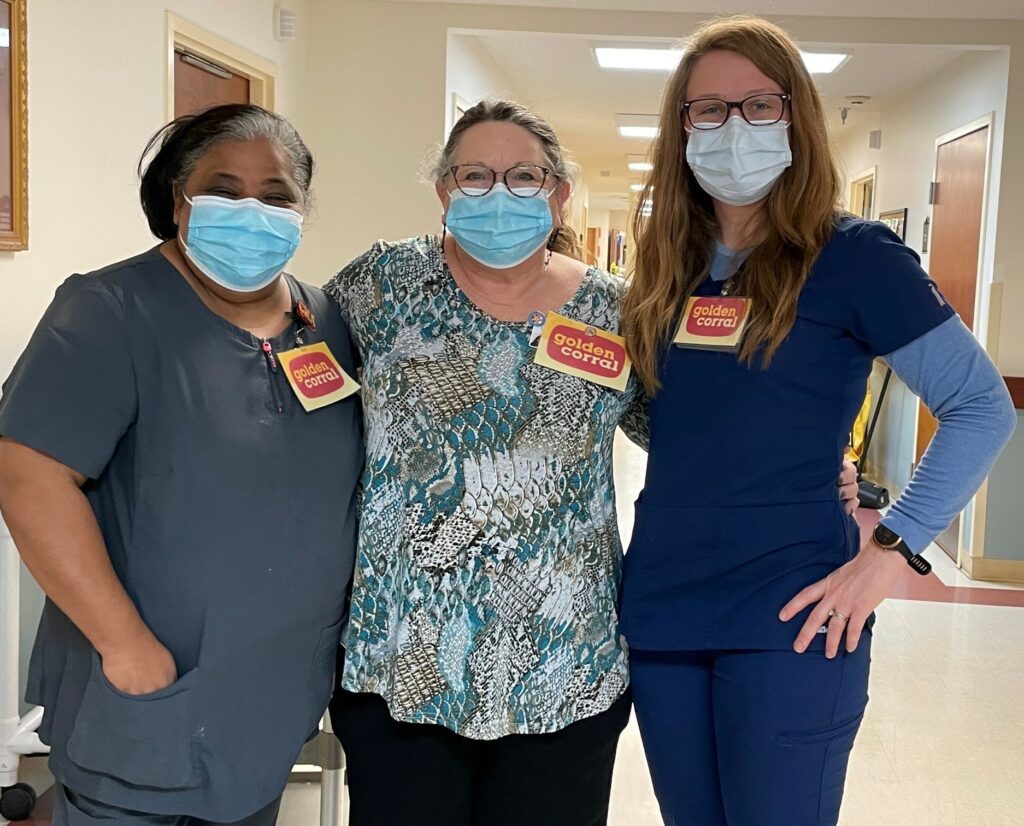
Liberty Celebrates Caregivers for National Caregivers Day
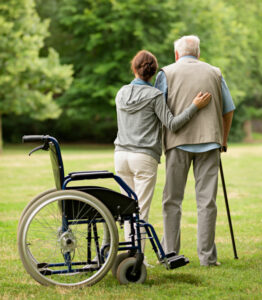 National Caregivers Day falls on the third Friday of February. It is a day to honor a special group of people who have selflessly devoted their time and energy to caring for others.
National Caregivers Day falls on the third Friday of February. It is a day to honor a special group of people who have selflessly devoted their time and energy to caring for others.
Individuals who take on the responsibility of caring for another person provide the essentials and necessities of daily living, from medical assistance to personal grooming. Along with direct, hands-on care, caregivers also typically look after the person’s house, nurture their social connections, and deal with doctors, hospitals and insurance companies. The list of tasks can be daunting, especially when maintaining their own personal lives and careers.
Caregiving is a challenging job, and one in five Americans are currently doing it. According to a 2020 report from the National Alliance for Caregiving (NAC) and the American Association of Retired Persons (AARP), 53 million adults in the United States are unpaid caregivers, which is up from the estimated 43.5 million caregivers in 2015.
Compared to 2015, the report also found a greater number of caregivers are providing care to more than one person. This finding, along with the increased prevalence of caregiving, shows our society continues to step up to provide unpaid care to family, friends and neighbors who need assistance.
If you know someone who is a caregiver, here are a few ideas on how you can show your appreciation and recognize all they do for others:
- Send them a letter or card, thanking them for everything they do.
- Give them a small gift that can bring them comfort such as a book, baked goods, hand lotion or a candle.
- Offer to care for the caregiver’s loved one so they can take an afternoon to rest and make time for themselves.
For our Liberty Hospice families, Liberty can provide respite services for up to five days at a time so caregivers can go on vacation or take a much needed and deserved break. Liberty can offer respite care wherever a person calls home or at one of our Liberty Healthcare and Rehabilitation locations throughout the Carolinas. For more information about our respite care services, give us a call at 800-999-9883 or request a free consultation online.
Liberty HomeCare and Hospice would like to thank all the caregivers who support and care for their loved ones, neighbors and friends. The kindness of caregivers should be celebrated not only on National Caregivers Day, but year-round.
What is Terminal Lucidity?
Some people experience an end-of-life phenomenon called terminal lucidity where they suddenly experience cognitive improvement before they pass away. There is a lot of mystery as to what causes this abrupt improvement in memory, consciousness or mental clarity in the final days, and it can often leave loved ones puzzled or with a false sense of hope.
In this article, we explain what you can expect if your loved one experiences terminal lucidity.
Who Experiences Terminal Lucidity?
Also referred to as paradoxical lucidity or end-of-life rallying, terminal lucidity can sometimes occur in people who suffer from severe neurological or psychiatric disorders such as Alzheimer’s disease, dementia or schizophrenia. People with brain tumors or those who have suffered a stroke can also experience this medical mystery.
As of right now, researchers aren’t sure why this phenomenon occurs. For this reason, it is impossible to determine who will experience it and who won't. 
When Does Terminal Lucidity Happen?
Terminal lucidity typically occurs hours or days before someone passes. The exact amount of time it lasts or when it begins varies from person to person. For those who witness their loved one regaining their mental clarity, it is important to recognize it is not a sign of miraculous healing. However, it is an opportunity to share an incredibly special moment with your loved one before the final goodbye.
What Happens During Terminal Lucidity?
During terminal lucidity, the physical symptoms of the individual’s condition may decrease in severity. A person who was completely non-verbal or who rarely communicated may begin talking again. The individual may appear more cheerful than normal and regain interest in eating or drinking. Someone with severe memory problems may start remembering moments from their past and suddenly be able to identify people they stopped recognizing. Your loved one may even start to see or talk to deceased people or pets they’ve known during their lives.
How Does Terminal Lucidity Affect Families?
Some families interpret terminal lucidity as a sign of healing, making their loved one’s passing shortly after the onset of the lucidity even more difficult. This is why Liberty Hospice advocates for educating families about what they can expect during hospice. We want you to be able to cherish every moment with your loved one during this precious time.
Liberty Hospice emphasizes comfort measures and counseling to deliver physical, emotional and spiritual support for everyone involved. Our bereavement services continue for the family after their loved one passes so they do not have to go through the journey of grief alone.
If you would like to know more about our hospice services across North Carolina and Virginia, give us a call at 800-999-9883 or use our online free consultation request form.
Sun Safety for Seniors: How to Prevent Skin Cancer
According to the Skin Cancer Foundation, 1 in 5 adults will develop some form of skin cancer by the age of 70. The risk increases as you age because you accumulate more sun exposure and sun damage over time. Older adults tend to have more fragile skin and some medications may also cause the skin to be more sensitive to sunlight.
Repeated ultraviolet radiation exposure causes skin cell mutations, which can lead to skin cancer. The main types of skin cancer are basal cell carcinoma (BCC), squamous cell carcinoma (SCC), melanoma and Merkel cell carcinoma (MCC).
There are some easy precautions you can take while enjoying time outdoors to reduce the chances of skin cancer.
 Stay in the Shade
Stay in the Shade
Staying in the shade is one of the best ways to prevent UV exposure. UV light is strongest between 10 a.m. and 4 p.m., so staying out of direct sunlight during those hours is ideal.
Wear Sunscreen
Any time you are going to be out in the sun, be sure to wear sunscreen with an SPF of at least 30. Make sure the product you are using has broad spectrum protection against both UVA and UVB rays. Be sure to check the expiration date before applying the sunscreen. Sunscreen is usually good for 2 to 3 years.
You should apply sunscreen to all areas of the body where the skin will be exposed to the sun. Don’t forget to protect your lips by using lip balm with sunscreen. Sunscreen should be reapplied every two hours or more frequently if you are sweating or swimming, even if a sunscreen says it is ‘water resistant.’
Cover Your Eyes and Head
The face is a common location to develop skin cancer. It’s also possible to develop cancer in the eyes. When enjoying the sunshine, wear sunglasses and a wide-brimmed hat that protects your eyes, forehead, nose, scalp and ears.
Perform Monthly Skin Examinations
Early detection is key, so you should examine your skin once a month. If you see something new, changing or unusual, it is recommended to get it checked by a dermatologist right away. The look of skin cancer varies from person to person, but here is a gallery of some skin cancer examples. Finding and treating skin cancer early can save your life.
There is nothing quite like enjoying a warm, sunny day, so we hope these tips can help you or a loved one do so safely.
New Year Resolutions for Caregivers
 As a caregiver, you play a unique role in the life of someone else. You probably spend a great deal of your time focused on this individual, and sometimes, you may feel like you can’t balance everything. In this article, we discuss some possible resolutions for the New Year to help you on your journey as a caregiver.
As a caregiver, you play a unique role in the life of someone else. You probably spend a great deal of your time focused on this individual, and sometimes, you may feel like you can’t balance everything. In this article, we discuss some possible resolutions for the New Year to help you on your journey as a caregiver.
Make Time for You
While it may seem counterproductive to make time for yourself when you have a loved one to care for, it is actually much needed. You need to have enough physical and mental energy to handle the job, and that means making time for your own needs on a regular basis, whether it is an hour a week or 15 minutes a day. You need that time to recharge.
Stop Feeling Guilty
Some caregivers feel guilty if they cannot be present for their loved one 24/7. That guilt can make you feel like you are letting your loved one down, even if you have been giving it your all. Let go of the guilt and understand you’re only human. You might not always fulfill your role as caregiver to a T, but you’re trying. You’re doing the best you can. More than likely, your loved one sees that and isn’t going to condemn you for not being there every second of the day. Plus, to be the best caregiver possible, you need to take care of yourself first.
Don’t Be So Critical of Yourself
You might make mistakes along the way, but you are doing more good than you realize. When you look at yourself less critically, you can see just how much you are accomplishing for your loved one. Rather than dwelling on the negative, focus on the positive. Remind yourself that you make a difference.
Get Organized
You have a lot going on in your life when you consider everything it takes to care for your loved one along with a household, job, and all of your other duties. Have a calendar where you input all important dates for your home, work and loved one. Keeping your house orderly and organized can also help you manage your daily routine.
Get Help
They say it takes a village to raise a child and the same concept applies to being a caregiver. It takes a great deal of time, effort and work to be a caregiver, especially if you’re doing it alone. This year, you may want to make it not just a resolution, but a priority to look into home health care or hospice services for your loved one.
Instead of doing it alone, Liberty HomeCare and Hospice Services provides an interdisciplinary care team dedicated to meeting the skilled needs of your loved one. This will take some of the stress off of you and give you time to care for your own needs. We provide home health, palliative care and hospice services wherever your loved one calls home.
If you’re ready to have an extra hand this year for your caregiving responsibilities, contact Liberty HomeCare and Hospice Services today. We’re available for a free consultation by calling 800-999-9883 or using our online form.
The Importance of Family Support for Adults in Hospice
Family support is an essential part of hospice. When remaining life can be measured in months instead of years, time with family is more precious than ever before. In this article, we take a look at why family support is so important for loved ones receiving hospice.
Advocate for Loved Ones
In some cases, individuals in hospice are not mentally or physically capable of communicating their needs. If you know your loved one’s wishes when it comes to their end-of-life care, you can advocate for them.
Family members are also more inclined to notice when their loved one is in pain or uncomfortable just by the tone of their voice, their facial expression or other cues. You know your loved one better than anyone else. When you notice these signs, you can let your hospice care team know so they can then provide medical care to ease their pain or discomfort.
Provide Emotional Support
Your presence can go a long way for your loved one during hospice. Sharing memories, laughter and quality time can provide your loved one an extra level of comfort that medical care cannot. There are many ways you can connect with your loved one to provide emotional support while letting them know they are sincerely loved and appreciated. Visit often, lend a listening ear, provide a comforting touch such as holding their hand, share special memories and treasure the time you still have together.
Provide Personal Care
Family members can also provide personal care for their loved one during hospice to help with everyday activities. Bathing, dressing, tidying up their home, running errands, cooking their favorite meal, delivering fresh flowers, providing transportation if needed or decorating their home during holidays are all ways family members can help their loved one.
Create the Ideal Home Environment
You can help your loved one create a space in their home that brings them joy. Put up artwork, posters, plants, mementos or other objects they love. Add a TV or music player so your loved one can play all their favorites. These additions can offer a sense of comfort and ease any stress they may be feeling.
How Liberty Helps You Support Your Loved One
Dealing with a loved one who has a life-limiting illness can be stressful for everyone involved. That’s why Liberty will be there to support not only your loved one, but the entire family as we provide comprehensive hospice care.
Our hospice nurses and aides visit regularly. Their wealth of experience can help your family find solutions to problems and ideas for better quality of life for your loved one. They will also educate family members on how to administer medications and use any medical equipment that may be necessary.
If you are feeling burned out as a caregiver, our volunteers can help provide respite care so you can take a break and recharge. It is important to take care of your own mental and physical needs as well as your loved one’s.
An important part of the care we offer comes after your loved one’s journey ends. Our bereavement services can ease the impact of death and the journey that follows. Bereavement services include support programs, educational information and counseling.
Wherever your loved one calls home, whether that is in a skilled nursing or assisted living community or a private home, we will answer the call to be there with an individualized plan of care that works for everyone involved. Contact us today to learn more about our hospice services by calling 1-800-999-9883 or using our online form to request a free consultation.

